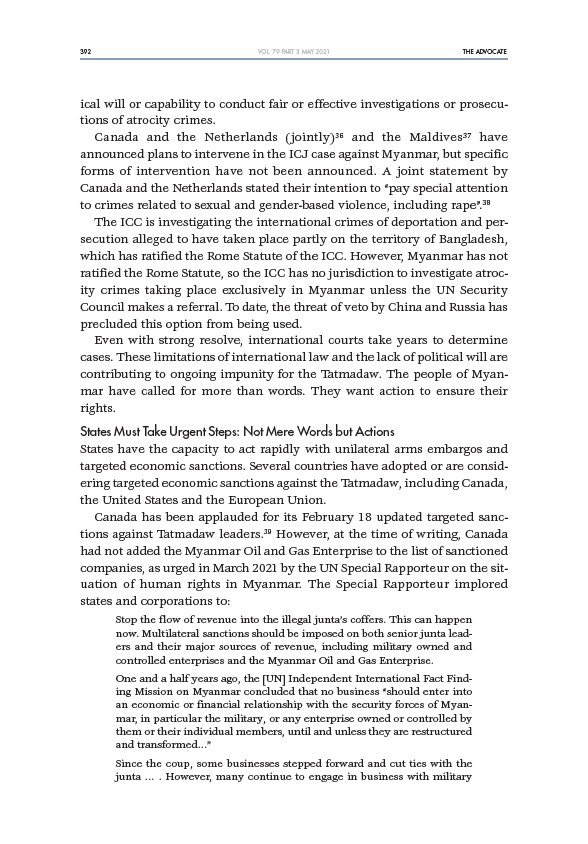
392 THE ADVOCATE
VOL. 79 PART 3 MAY 2021
ical will or capability to conduct fair or effective investigations or prosecutions
of atrocity crimes.
Canada and the Netherlands (jointly)36 and the Maldives37 have
announced plans to intervene in the ICJ case against Myanmar, but specific
forms of intervention have not been announced. A joint statement by
Canada and the Netherlands stated their intention to “pay special attention
to crimes related to sexual and gender-based violence, including rape”.38
The ICC is investigating the international crimes of deportation and persecution
alleged to have taken place partly on the territory of Bangladesh,
which has ratified the Rome Statute of the ICC. However, Myanmar has not
ratified the Rome Statute, so the ICC has no jurisdiction to investigate atrocity
crimes taking place exclusively in Myanmar unless the UN Security
Council makes a referral. To date, the threat of veto by China and Russia has
precluded this option from being used.
Even with strong resolve, international courts take years to determine
cases. These limitations of international law and the lack of political will are
contributing to ongoing impunity for the Tatmadaw. The people of Myanmar
have called for more than words. They want action to ensure their
rights.
States Must Take Urgent Steps: Not Mere Words but Actions
States have the capacity to act rapidly with unilateral arms embargos and
targeted economic sanctions. Several countries have adopted or are considering
targeted economic sanctions against the Tatmadaw, including Canada,
the United States and the European Union.
Canada has been applauded for its February 18 updated targeted sanctions
against Tatmadaw leaders.39 However, at the time of writing, Canada
had not added the Myanmar Oil and Gas Enterprise to the list of sanctioned
companies, as urged in March 2021 by the UN Special Rapporteur on the situation
of human rights in Myanmar. The Special Rapporteur implored
states and corporations to:
Stop the flow of revenue into the illegal junta’s coffers. This can happen
now. Multilateral sanctions should be imposed on both senior junta leaders
and their major sources of revenue, including military owned and
controlled enterprises and the Myanmar Oil and Gas Enterprise.
One and a half years ago, the UN Independent International Fact Finding
Mission on Myanmar concluded that no business “should enter into
an economic or financial relationship with the security forces of Myanmar,
in particular the military, or any enterprise owned or controlled by
them or their individual members, until and unless they are restructured
and transformed…”
Since the coup, some businesses stepped forward and cut ties with the
junta … . However, many continue to engage in business with military